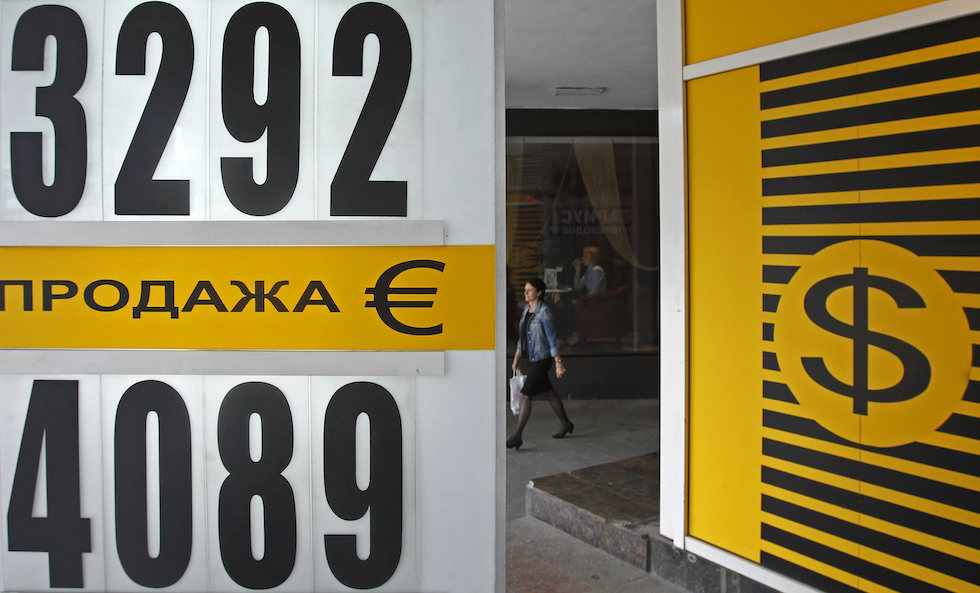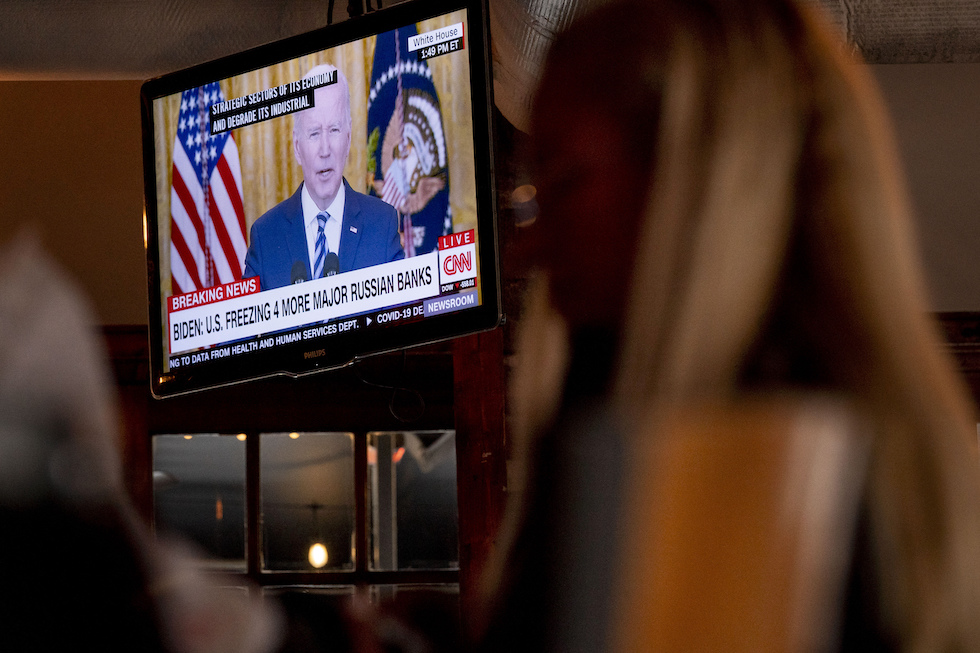On The Money — Biden brings down hammer on Russian banks

Happy Thursday and welcome to On The Money, your nightly guide to everything affecting your bills, bank account and bottom line. Subscribe here: digital-stage.thehill.com/newsletter-signup.
Today’s Big Deal: President Biden unleashed a series of economic sanctions against Russia but stopped short of targeting the country’s oil and gas sector or pushing to kick Russia out of the international payment system. We’ll also look at how lawmakers are reacting to the sanctions and more pressure on the Biden administration to wipe out student loans.
But first, find out what Sean Penn is doing in Ukraine.
For The Hill, we’re Sylvan Lane, Aris Folley and Karl Evers-Hillstrom. Reach us at slane@digital-stage.thehill.com or @SylvanLane, afolley@digital-stage.thehill.com or @ArisFolley and kevers@digital-stage.thehill.com or @KarlMEvers.
Let’s get to it.
Biden: US will sanction Russian banks

President Biden on Thursday said the U.S. would sanction major Russian banks and impose export controls on Russia to curtail Russian high-tech imports as part of a coordinated effort with allies to penalize the Kremlin for its military attack against Ukraine.
In remarks from the East Room of the White House, Biden said the sanctions would target Russian banks holding a combined $1 trillion in assets, including Russia’s two largest financial institutions, Sberbank and VTB Bank. He said the U.S. would also impose sanctions on additional Russian elites with links to the Kremlin.
“It will be a major hit to Putin’s long-term strategic ambitions,” Biden told reporters.
- The sanctions will prevent the Russian state-controlled banks from processing payments through the U.S. financial system.
- The U.S. will target 10 Russian individuals, including those close to Russian President Vladimir Putin and elites working in the financial sector, with new restrictions.
- The export controls will restrict Russia’s ability to import sensitive U.S. technology, like semiconductors, lasers, and sensors needed for Russian military equipment.
Biden did not announce sanctions against the Russian oil or natural gas industry, which is the main driver of the Russian economy. Biden has expressed concern about how taking that step could impact fuel prices in the U.S. and Europe. He also did not push U.S. allies to kick Russia out of the SWIFT international banking system, a move Ukraine has pushed for.
Biden said Thursday it would take time for Putin to feel the economic pain of the penalties and suggested that it could cause the Russian leader to change course on his military campaign.
The Hill’s Morgan Chalfant details the sanctions package here.
ALSO READ: Belarus targeted with dozens of sanctions over Russian invasion
LEADING THE DAY
Biden defends allowing Russian access to SWIFT
President Biden on Thursday defended maintaining Russia’s access to an international messaging system for banks despite pressure from Ukrainian leaders.
The U.S., United Kingdom and European Union on Thursday announced strict new penalties on the Russian economy, financial institutions and influential elites close to Russian President Vladimir Putin. But the Western allies did not bar Moscow from SWIFT, even after Ukrainian government officials urged them to do so Thursday morning.
- “It is always an option, but right now that’s not the position that the rest of Europe wishes to take,” Biden told reporters, while also arguing the sanctions imposed by the U.S. and European allies were more powerful than targeting SWIFT.
- The Biden administration also announced plans to impose sanctions on individuals and entities in Belarus, accusing the nation of supporting and facilitating Russia’s invasion of Ukraine.
- Banks across the world use SWIFT to finalize transactions and transfers. Cutting Russia off from SWIFT would make it incredibly difficult for its banks to operate efficiently, but could also wreak economic havoc for European nations who depend on Russian oil and natural gas exports.
Stocks plunged across the world Thursday and oil prices spiked in the wake of Putin’s invasion and the growing economic costs. While the new sanctions fell short of Ukrainian desires, they’ve already made waves across the Russian financial system.
The value of the Russian currency plunged to a record low Thursday, with 1 ruble now worth barely more than an American penny.
Read more from Sylvan here.
VIRTUAL EVENT ANNOUNCEMENT
America’s Report Card—Friday, Feb. 25; 12:30 PM ET/9:30 AM PT
Ahead of the State of the Union, The Hill takes stock of the administration’s response to the pandemic and its impact on the economy. We’ll discuss legislative priorities in a midterm year and the potential for any bipartisan action. Join us for interviews with Majority Whip Jim Clyburn (D-S.C), Sen. Kevin Cramer (R-N.D.), WH Sr. Advisor Cedric Richmond and more. RSVP today.
MARKET WHIPLASH
Stocks close with gains after remarkable comeback
Stocks rallied to close with gains Thursday after plunging in the wake of Russia’s invasion of Ukraine.
The Dow Jones Industrial Average closed with a gain of 92 points after falling more than 800 points after the opening bell. The Nasdaq soared 3.3 percent higher at the closing bell after opening with a loss of 2.2 percent, and the S&P 500 index closed 1.5 percent higher after it opened with a loss of 2.1 percent.
Oil prices also edged down slightly after President Biden announced sanctions intended to avoid massive energy shocks. The price of a barrel of West Texas Intermediate Crude, the baseline for U.S. oil prices, was up to $98.78 shortly after 9:30 a.m but edged down to $92 later in the day. Intercontinental Exchange Brent crude oil, the international benchmark, reached $104.15 a barrel before falling back to roughly $99.
STUDENT LOANS
Democrats press Education secretary over plans to resume student loan payments
A group of Democrats sent a letter to Education Secretary Miguel Cardona this week pressing for further information about how the administration plans to resume federal student loan payments and ensure borrowers receive adequate support.
Sen. Elizabeth Warren (D-Mass.) and Reps. Lauren Underwood (D-Ill.) and Colin Allred (D-Texas) led their colleagues in a letter to Cardona on Wednesday, seeking “additional detail on the scheduled resumption of federal student loan payments following the expiration of the payment pause on May 1, 2022.”
- In their letter to Cardona this week, the lawmakers wrote that, while they “appreciate the Biden administration’s actions to extend the payment pause,” they are concerned that “with less than 70 days until the scheduled expiration, borrowers may lack clarity about the timeline associated with the resumption of payments.”
- Lawmakers said millions of borrowers “appear to be at risk of missing out on vital information about the payment restart,” before citing estimates from the Government Accountability Office (GAO) saying roughly half federal student loan borrowers “are at increased risk of delinquency and in need of additional, targeted engagement before and after payments resume.”
- While lawmakers said the Education Department) selected email as its primary communication method for borrowers, they added the office “was missing valid email addresses for approximately 5.5 million borrowers as of December 2021.”
Lawmakers are pressing the department information on timing for due dates of student loan payments; when the latest first payment is due; how long borrowers who don’t make payments following the May deadline have until they become delinquent; are charged late fees; and have negative credit reports triggered, among other things.
They are requesting answers by March 9.
Aris has more here.
COMING SOON
Stay ahead of the news cycle with The Hill’s new Evening Report, featuring the day’s top stories and a look ahead to tomorrow.
Good to Know

Lawmakers in both parties wasted no time on Thursday pressing President Biden to impose tougher sanctions on Russia, saying the economic penalties levied to date don’t go far enough to punish President Vladimir Putin for his imperial designs on Ukraine.
Even Democratic allies urged Biden to go beyond the latest set of sanctions he unveiled earlier Thursday, which were aimed at curbing Russia’s access to foreign capital, hobbling the financial freedoms of Moscow’s wealthy elite and preventing Putin’s military from obtaining the latest high-tech weapons systems.
Here’s what else we have our eye on:
- Sen. Rick Scott’s (R-Fla.) surprising decision to release his own GOP agenda has opened a new front for criticism from Democrats and even drawn some fire from fellow Republicans going into the midterm campaign season.
- CitiBank has announced its plans to eliminate overdraft fees among other fees by Summer 2022.
- A union organizer and two Amazon workers were arrested by the New York City Police Department outside of a Staten Island warehouse in an escalation of tensions between the facility’s nascent union and the e-commerce giant.
- Lobbying firms terminated their contracts with the company behind the Nord Stream 2 natural gas pipeline after the U.S. imposed sanctions on the Russian firm.
That’s it for today. Thanks for reading and check out The Hill’s Finance page for the latest news and coverage. We’ll see you Friday.
We want to hear from you! Take our newsletter survey to provide feedback on our offerings.
Copyright 2023 Nexstar Media Inc. All rights reserved. This material may not be published, broadcast, rewritten, or redistributed. Regular the hill posts







